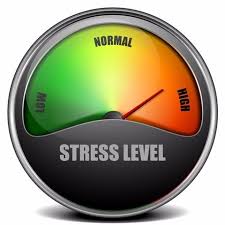Chronic Stress and Mood Disorders
 Ever feel so amped up you think you could explode?
Ever feel so amped up you think you could explode?Or so numb that nothing seems to matter?
Not getting good sleep, eating too much or not enough?
Overly relying on alcohol to relax, or coffee to get moving?
Feel like stress is killing you?
Well if it’s your chronic state, it is no doubt contributing to the breakdown of healthy physiological processes, with harsh unwanted consequences.
What Is Stress?
We experience stress as mental or emotional strain resulting from adverse or very demanding circumstances. It’s true that for the majority of us, modern life is full of adverse or very demanding circumstances.
Here’s how it works in our bodies:
Stress is the natural reaction to perceived threat. The alarmed nervous system signals the release of hormones cortisol and adrenaline from the adrenal glands. These trigger the body to prepare to fight or flee. Instantly, blood pressure increases and energy supplies to brain and muscles are boosted in preparation for the upcoming fight or flight. In the process, functions of the body that are non-essential for immediate survival are curbed, altering immune system responses and suppressing the digestive system, reproductive system, and growth processes. Once a perceived threat has passed, hormone levels return to normal. As adrenaline and cortisol levels drop, your heart rate and blood pressure return to baseline levels, and other systems resume their regular activities.
This is life-saving capacity of the nervous system in the face of genuine danger. However, for many of us the experience of overwhelm, emotional strain and burden are a constant. When stressors are always present and you constantly feel under attack, that fight-or-flight reaction stays turned on.
So here’s the most important thing you need to know about stress management and your health:
The chronic activation of the stress-response system results in the steady disrupting influence of stress hormones and neurochemicals on healthy bodily processes. In the long term, this disruption contributes to system breakdowns that create numerous health problems, including:
- Anxiety
- Depression
- Digestive problems
- Headaches
- Heart disease
- Sleep problems
- Fatigue
- Weight gain
- Memory and concentration impairment
In short, while we may be painfully aware of the emotional cost of chronic stress reactivity — to our mood, to our relationships, to our quality of life — Inside our bodies, sustained long-term stress IS deadly to our health. And unless we move the needle on our stress reactivity toward a default calm setting, we can’t fully address all the roots of chronic illness.
At Plum Spring Clinic, we rarely encounter a patient with chronic IBS or other GI problems for whom chronic stress and unresolved trauma are not major contributors to their illness. Our counseling and coaching provide the compassionate and skilled support necessary for moving the needle on stress reactivity toward the calm default setting that allows the body to heal, digest, and repair.
Mood
 There is solid evidence that prescription medications are, more often than not, weak factors in helping people with depression, anxiety, sleep and other mood disorders. At the same time, we are coming to understand that addressing hormones, gut bacteria, inflammation, nutrition, toxins, exercise and past traumas can have a powerful effect.
There is solid evidence that prescription medications are, more often than not, weak factors in helping people with depression, anxiety, sleep and other mood disorders. At the same time, we are coming to understand that addressing hormones, gut bacteria, inflammation, nutrition, toxins, exercise and past traumas can have a powerful effect.
We use a variety of diagnostic tests to help us identify which factors are contributing to a disturbance of function of the nervous system and the other physiological but closely related systems that contribute to your symptoms. Understanding why you are sad, distracted, anxious, fatigued or prone to anger is the first and most important step in helping you become well.
We are a small team of expert practitioners who will support your recovery with a holistic approach to healing unresolved trauma, addressing traumatic stress patterns, and establishing resilience to stress.
Trauma is very often a major component in the chronic stress reactivity that plays havoc with physical, emotional and mental health. In his 25 years of work treating patients with chronic illnesses that don’t respond well to mainstream approaches, Dr. Sharp has found that most if not all of his chronically unwell patients have trauma in their past. In his experience, the illness can’t be healed without addressing unresolved trauma. His interest and concern led him to training in the practice of Somatic Experiencing (SE) and Internal Family Systems (IFS) therapy.
